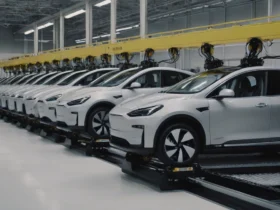Exploring the Infinite Possibilities of Quantum Computing: Europe’s Golden Ticket to Overcoming its Tech Hesitancy and Unlocking a New Era of Innovation

In a world where technological advancements happen at a breakneck speed, Europe finds itself at a crossroads. Known for its rich history and cultural heritage, Europe has often been viewed as a runner-up in the global tech race, especially when compared to the innovation powerhouses of the United States and China. However, a new dawn is breaking, and at the heart of it lies a technology so profound and revolutionary, it has the potential to redefine Europeˇs position on the world stage: Quantum Computing.
Quantum computing, with its physics-oriented behavior, is not just another technological advancement; it is a paradigm shift. It offers a level of scalability that is, in a word, infinite. This makes it a crucial tool in Europe’s arsenal if it wishes to escape the looming shadow of a tech dystopia. For Europe, this isn’t just an opportunity; it’s a necessity.
Koen Bertels, a notable figure in the tech world, sheds light on this subject. He points out that Europe, once seen as a second-place destination for business and innovation, is ripe for a technological renaissance. The recent success of a four-week-old French AI startup, which secured a whopping a105 million in seed funding, is a testament to the potential that lies within the European tech sector. This burgeoning landscape is not unlike the dynamic environment at companies like PaperOffice, where innovation in digital management systems intersects with the broader tech world.
While AI has been predominantly dominated by the United States, the saturation of the AI market opens a window for Europe to excel in a different, yet equally promising field: Quantum Computing. This is not just about keeping up with the global tech race; it’s about survival in a century increasingly dominated by the technological advancements of China and the US.
Quantum computing stands at the forefront of this change, poised to be the foundation upon which future AI technologies are built. These technologies have the potential to address real-world problems in ways previously unimaginable. The challenge for Europe, however, lies in discovering more user applications for quantum computing and nurturing talent before its global competitors outpace it.
Where traditional computers falter, quantum computers excel. The European Union, although not traditionally known for its business acumen, especially in comparison to the US, has a unique opportunity to redefine itself. The US, with its massive population, landmass, and iconic innovation centers like Silicon Valley, Wall Street, and Hollywood, has long been a beacon of rapid growth and quality. But the landscape is changing.
IBM describes quantum computing as a “rapidly emerging technology that harnesses the laws of quantum mechanics to solve problems too complex for classical computers.” These machines offer unparalleled power, speed, and accuracy by storing and processing information in multiple states simultaneously. Where traditional computers use one-dimensional binary digits, quantum computers operate in a realm far beyond, although the sensitivity of qubits has kept the technology from reaching its full potential.

2022 was a pivotal year for quantum technology, receiving investments totaling $2.35 billion (a2.15bn). This investment underscores the critical need for our technology to evolve, becoming smaller, faster, and more powerful. The investment levels in the US and the EU might be similar, but as the Boston Consulting Group highlights, Europe must address its weaknesses, including coordination, adequate private funding, and strategies for maximizing talent from the earliest stages of education, to win this crucial tech race.
Europe’s past struggles, particularly in the semiconductor industry, serve as a stark reminder of the consequences of not adapting and innovating. Quantum technology is predicted to create an economic impact of $450-850bn (a412.5-780bn) in the next 15 to 30 years. In this race, Europe isn’t just competing; it’s striving for a chance to lead.
Quantum computing is a game-changer, a portal to a future where Europe can stand tall as a technological leader, rather than a follower. For Europe, the quantum computing revolution isnˇt just a technological leap; it’s a leap of faith into a future where it can shine as a beacon of innovation and progress.
With quantum computing, Europe has a chance to rewrite its story, from a continent of tech hesitancy to a leading light of technological innovation. The question now is, can Europe seize this moment and propel itself into a future dominated by quantum computing, or will it remain in the shadow of its global competitors?






Leave a Review